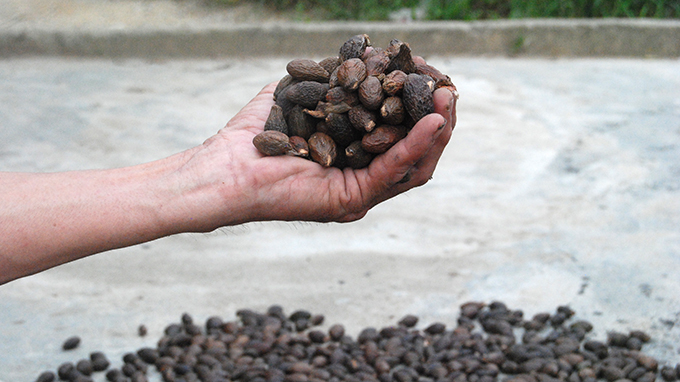Trees that bear beans with medicinal properties in central Vietnam’s Quang Nam Province are being poached, with several people killed in the process. The “uoi” tree, or the sterclia lyhnophora, mainly grows in Vietnam’s central region and the Central Highlands.
In recent years, since beans from the “uoi” tree began to be exported, locals and people from other provinces have flocked to the forests surrounding the section of the Truong Son Mountain Range in Quang Nam Province to pick the ripe beans that fall from the trees.
This summer has seen a bumper crop of “uoi” and they are fetching high prices, causing more and more people to scramble to pick the beans.
However, as only a small number of ripe beans fall from the trees, people are chopping them down to get as many beans as possible.
Most of the trees, including immature ones, have now been felled across the province’s eight mountainous districts, mostly Bac Tra My and Nam Tra My.
According to H., a local “uoi” bean picker, workers like him now have to go deeper into forests to find the beans, as trees on the edge of the forests have already been picked clean or cut down.
Only one out of every ten groups picks the beans, while the rest chop down the trees without any mercy, H. added.
Ho Tan Loc, another “uoi” bean picker, said that hundreds or even thousands of people from Dong Nai Province in the southern region, Lam Dong Province in the Central Highlands, and Quang Nam’s other districts have flocked to the area.
Loc once watched a group chop down 20 trees a day. They collected a mere 100kg of ripe beans, leaving the green ones behind.
Ripe beans that fall from the trees on their own typically fetch more than VND200,000 (US$10) per kg, while green ones sell for less than half the price.
“Our group could only pick what was left on the ground. Most of the trees have been chopped down, with only young, beanless trees spared. If they didn’t chop down the trees, everyone would benefit from the fallen beans,” Loc lamented.
Phan Trung Soi, vice head of the Bac Tra My Forest Ranging Office, expressed concerns over the rampant destruction of “uoi” trees.
Locals and ethnic minority people in the area are also mowing down the trees, as if they did not, people from other provinces would.
Over half of 83 tons of “uoi” beans collected in Bac Tra My District come from chopped trees, Soi noted.
Felling “uoi” trees has also brought about fatal consequences for the choppers and even the innocent bean pickers.
Once chopped, the 20-30m tree trunks cause other trees in the vicinity to fall, leaving choppers and bean pickers at risk of being hit by the heavy trees.
Since the start of the summer, many have sustained critical injuries and some dozen have been crushed dead by the chopped “uoi” trees.
Le Ngoc Kich, vice head of the Nam Tra My District People’s Committee, said that his committee is planning to take more measures to stop the indiscriminate chopping, including improving the performance of local workers paid by the government to care for the forest and raising locals’ awareness and involving them in protecting the “uoi” trees.
Like us on Facebook or follow us on Twitter to get the latest news about Vietnam!


















































